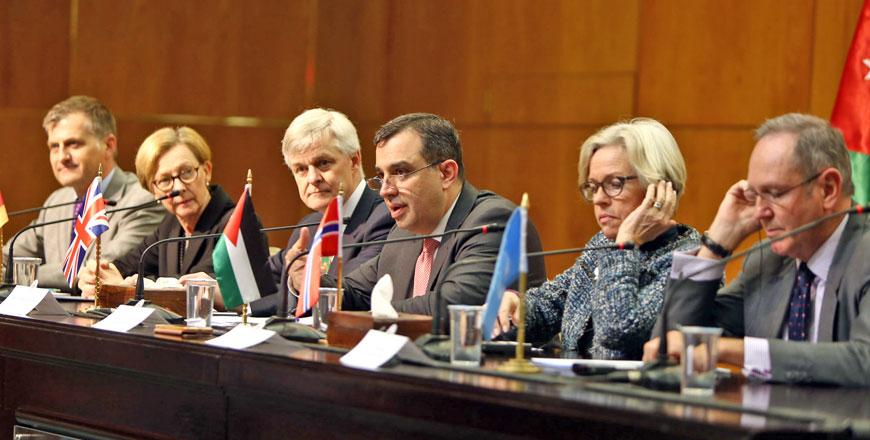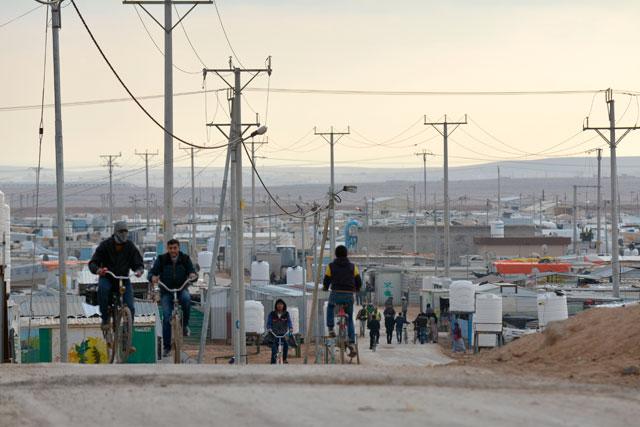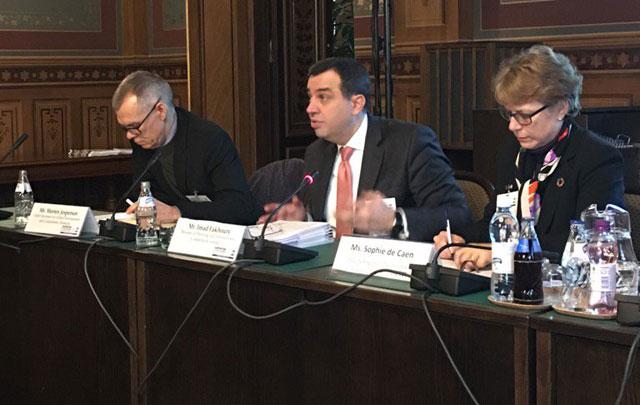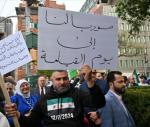You are here
Jordan, donors endorse new refugee response plan
By Rana Husseini - Jan 12,2017 - Last updated at Jan 12,2017
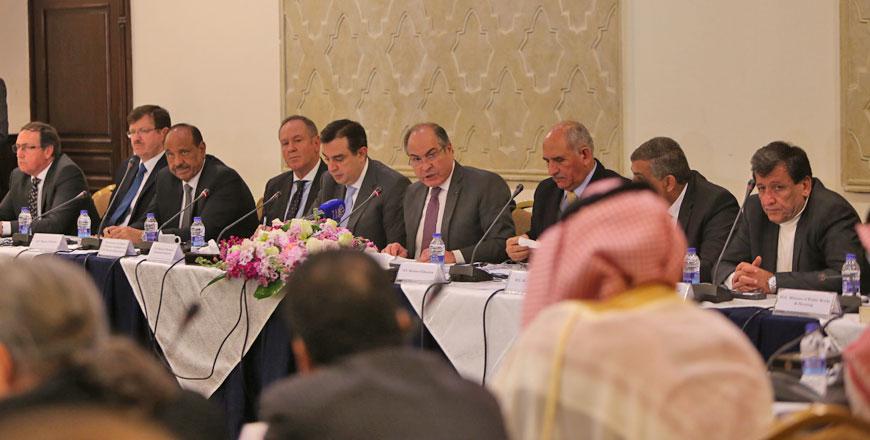
Prime Minister Hani Mulki addresses a meeting where a new refugee response plan was agreed with donors in Amman on Thursday (Petra photo)
AMMAN — The government and the international community on Thursday endorsed a $7.6-billion three-year Jordan Response Platform (JRP) for the Syria Crisis.
The JRP for the Syria Crisis 2017–2019 is a call for further collective action to respond to the crisis, and it builds on the paradigm-shift and resilience-focused approaches adopted to proactively respond to the protracted humanitarian and development challenges, according to the plan’s literature.
The platform was approved during a two-hour meeting that was attended by Prime Minister Hani Mulki, ministers, ambassadors, diplomats,” as well as high-level officials and civil society representatives.
Mulki reiterated during the meeting Jordan’s commitment to upholding its moral obligations towards Syrian refugees, even though it carries “more than its fair share of the response”.
“Jordan has been pioneering a resilience-based approach as outlined in our rolling response plans that we jointly developed and in adopting a paradigm shift in dealing with Syrian refugee by turning the refugee challenge into an economic opportunity as proposed in the Jordan Compact,” Mulki told the gathering, referring to a document issued during the London refugee conference in February last year outlining commitments by Jordan towards Syrian refugees and pledges by donors to help in the mission.
The premier stressed the importance and “invaluable” support of the international community in shouldering the impact of the Syrian crisis on Jordan because it helped Jordan remain resilient “in a very difficult regional setting”.
“The situation in Syria and the unprecedented refugee crisis have been globally recognised as the worst humanitarian disaster the world has faced since the World War II, posing an increasing threat to global security, development and economic growth,” Mulki said.
“It is a crisis whose magnitude continuously demands a collective response equal to the scale of the challenge,” the premier added.
But Mulki was quick to add that the Kingdom needs the continued support of its partners because it has reached its maximum capacity with no fiscal space remaining under the new International Monetary Fund programme, nor in terms of resources, existing physical and social infrastructure or government services.
“Without the continued support of our key partners, it will negatively impact our overstretched ability to continue providing basic services to Syrians whilst maintaining service levels without adversely effecting Jordanian citizens or risking our hard earned development gains,” the premier said.
The new JRP also represents a further step towards a comprehensive response that effectively links short-term coping solutions with longer-term initiatives aimed at strengthening local and national resilience capacities.
The objective of the JRP is to upscale critical capacities of the central, regional and local authorities, mitigate pressures on Jordanian host communities and to foster the resilience of the service delivery system, municipal services and infrastructure in areas critically affected by demographic stress, according to the plan, which also aims to meet the needs of Syrian refugees in and out of camps as well as vulnerable Jordanians affected by the Syria crisis.
Other objectives include expanding employment and livelihood opportunities for Syrian refugees and Jordanians, ensuring that all Syrian children have access to education and supporting the government’s budget to cope with the additional financial burdens.
Also addressing the international community was Planning and International Cooperation Minister Imad Fakhoury, who said that his ministry has taken “bold steps to improve aid coordination, enhance transparency and strengthen accountability as means of improving overall aid effectiveness, thereby ensuring that humanitarian and development aid channelled to the Syrian crisis are efficiently used by all implementing partners”.
The 2017-2019 JRP outlines a coherent, sequenced, and sustainable response to the multifaceted impacts of a complex crisis, Fakhouri explained, whereas the JRP 2016-2018 represented a major paradigm shift in the way to respond to protracted humanitarian and development challenges.
Fakhouri highlighted some of the achievements that were accomplished over the past year, guided by the JRP goals.
“Access to education has been improved, with almost 170,000 Syrian refugee boys and girls enrolled in public schools, and 50,000 Syrian boys and girls provided with remedial education,” Fakhouri said.
Furthermore, Fakhouri added, communicable disease control has been strengthened, with over 1 million Syrian refugees and Jordanian children under five vaccinated against polio.
In his remarks, UN Resident and Humanitarian Coordinator David McLachlan-Karr praised the JRP saying that its cornerstone is a programme built under a resilience umbrella that covers the needs of refugees, the needs of affected vulnerable Jordanians and the structures and services of the government of Jordan.
“We believe the JRP 2017-19 builds on the successes of the past years and on the confidence that all stakeholders have gained in the JRP,” McLachlan-Karr said.
The UN representative applauded the Kingdom for its “steadfast commitment, spanning almost six years, to respond with agility and with creativity to the effects of the Syria crisis in Jordan”.
Meanwhile, US Ambassador to Jordan Alice G. Wells said that following the vision set by His Majesty King Abdullah, the government of Jordan has led the international community from a JRP that focused on emergency “response”, to the current document that emphasises building long-term resilience.
“The United States embraces the government’s focus on the urgent and immediate needs of the communities hosting refugees, and its forward-looking goals of tackling investment promotion, trade expansion, and job creation, as articulated in the Compact,” Wells said.
Jordan’s current situation calls for “all of us to re-conceptualise the crisis to one that emphasises long-term resilience for Jordanians and their Syrian guests… and I urge my fellow donors and international partners to follow the government of Jordan’s lead in rethinking and retooling how we fund and implement our programmes with the goal of channelling assistance increasingly through host institutions,” Ambassador Wells added.
Speaking to The Jordan Times, British Ambassador Edward Oakden said: “Ensuring Jordan’s continued stability and resilience is a priority for the UK.”
“The London Conference a year ago set the basis for a new way of approaching the partnership between the international community and Jordan, and the latest version of the JRP is a strong example of this partnership in practice, working together to improve Jordanians’ and Syrians’ lives. Now we need to sustain this momentum in the year ahead,” Oakden said.
“When we work together,” the envoy added, “we achieve real results: already 23,000 additional children are in school and thousands of jobs have been formalised”.
“When all contributions to date are factored in, we will also see around 70 per cent of the London commitments met by international donors. By the standards of most international appeals, that is an extraordinary scale of response, befitting the extraordinary nature of the crisis,” Oakden added.
The UK provided almost quarter of a billion dollars in 2016 alone, and almost three quarters of a billion since the start of the Syrian crisis, “partnering with you to maintain Jordan’s security, stability and economic sustainability”, according to Oakden.
Related Articles
AMMAN — Jordan has secured 60 per cent of the funding required under the 2016 Jordan Response Plan (JRP) to the Syrian crisis, double what w
AMMAN — The government of Jordan and the international community on Thursday endorsed the Jordan Response Platform (JRP) for the Syria Crisi
AMMAN — Planning and International Cooperation Minister Imad Fakhoury has participated in an international conference in Helsinki to discuss


